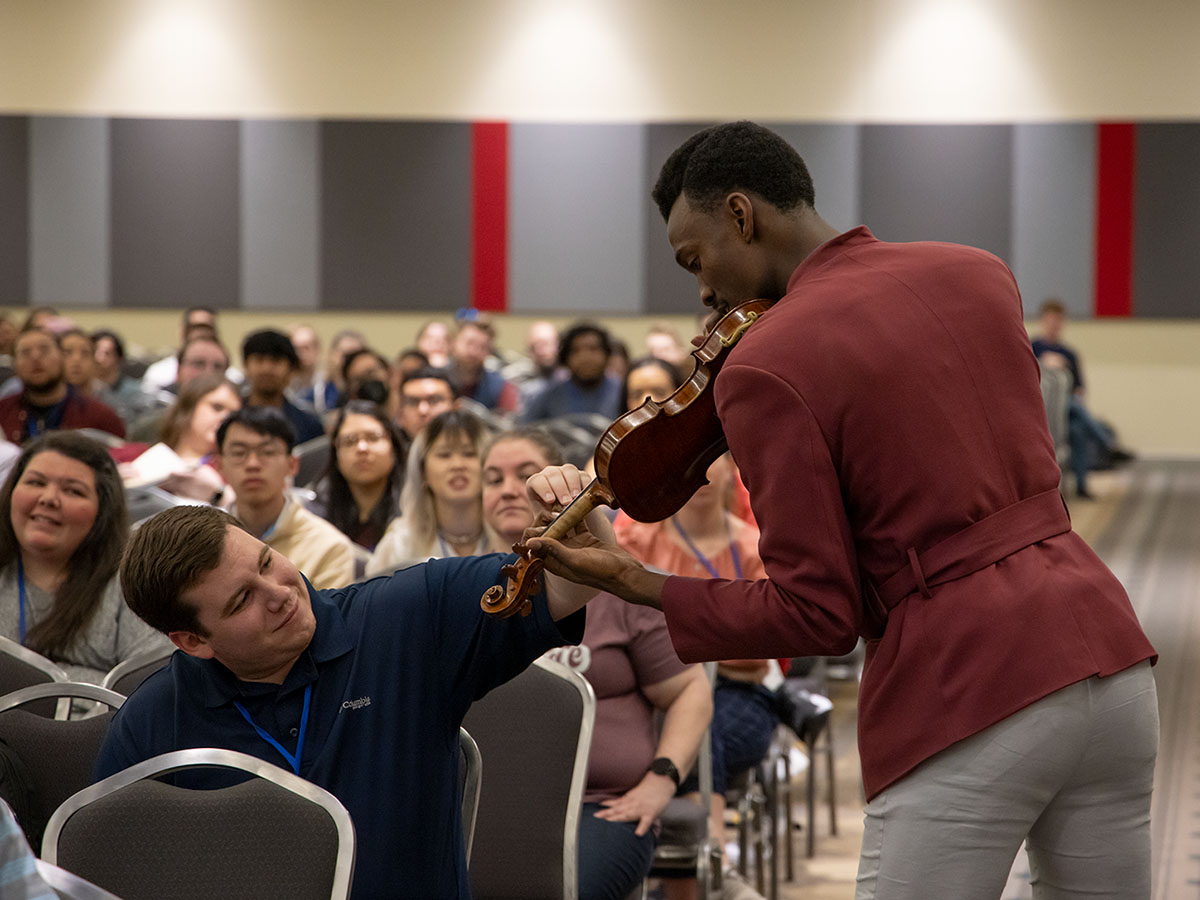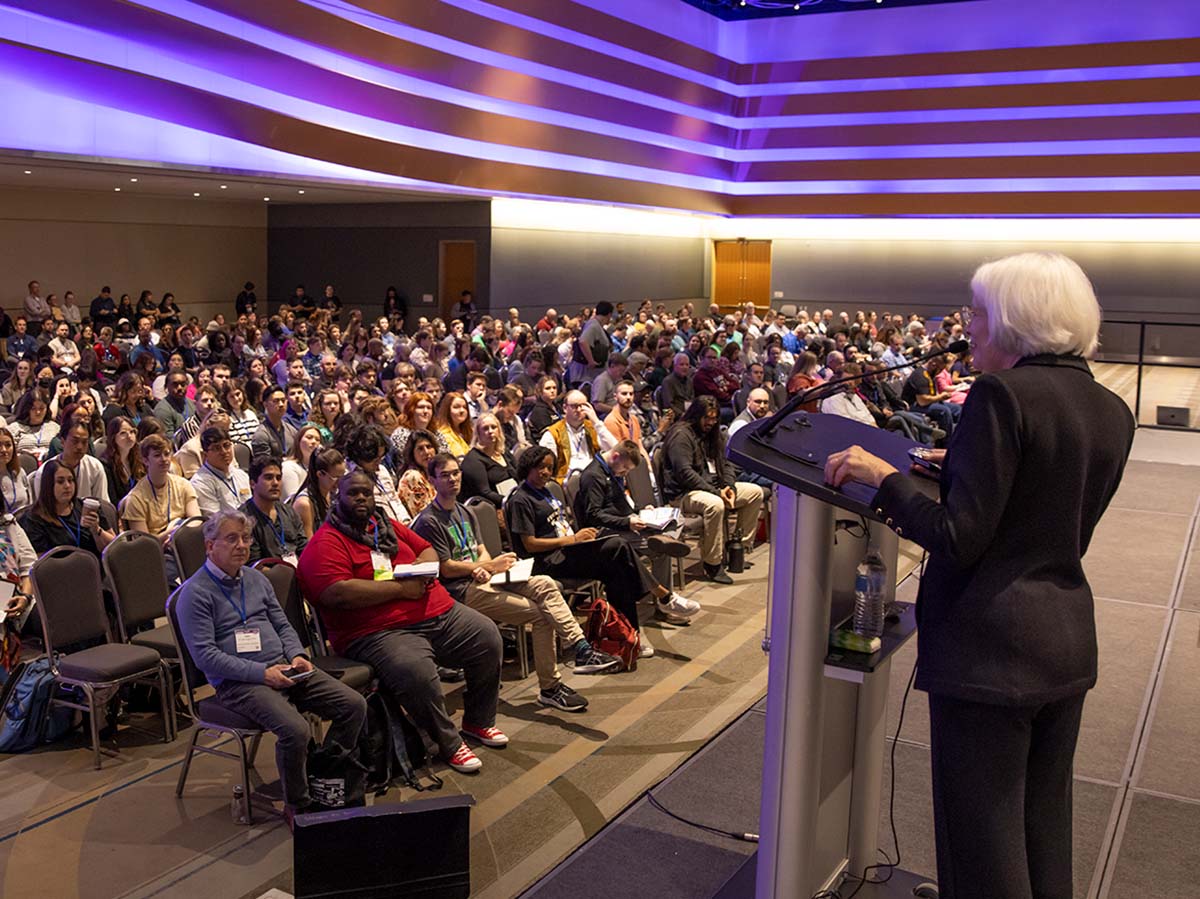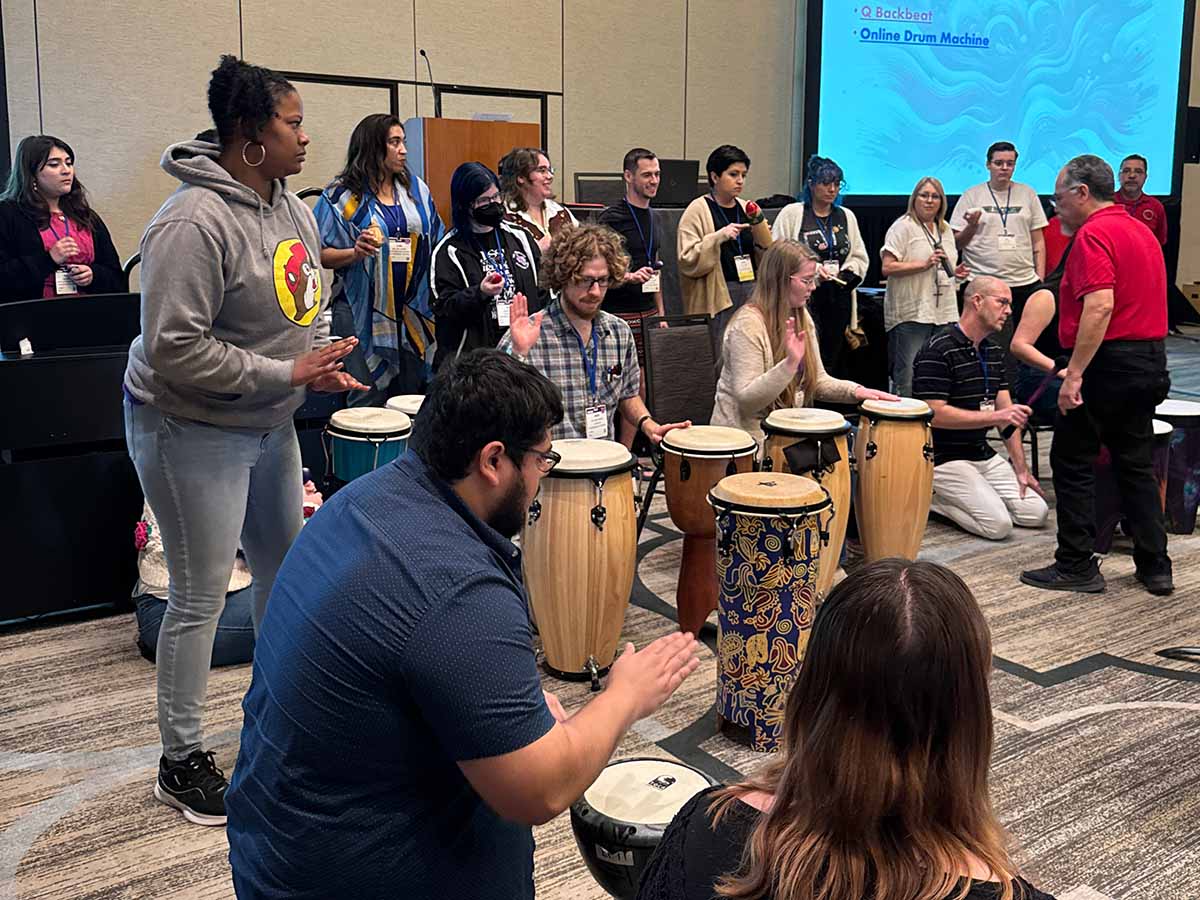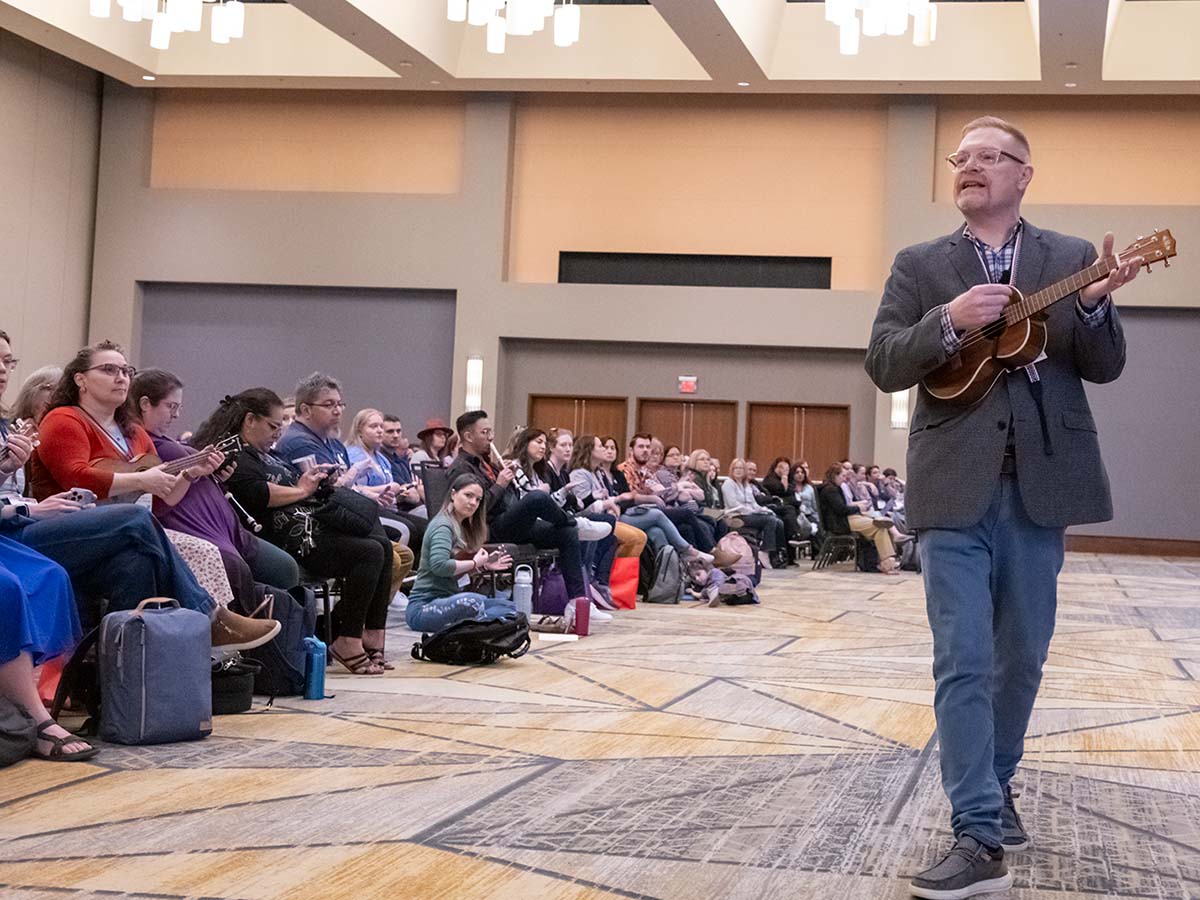Clinic Proposals
Accepted May 1-June 1
The TMEA Clinic/Convention hosts hundreds of clinics on a wide variety of topics for current and future PreK–College music educators in every discipline. Share your innovative teaching methods and transformative strategies with a community of thousands of educators and students eager to learn and grow.
Proposals are accepted online May 1-June 1.
Clinic Types
Regardless of clinic type, the presentation and content must be pedagogical, not commercial.
- Invited: A clinician’s attendance is not sponsored by a company.
- Industry (TMEA Exhibitor Sponsored): A clinician’s attendance is paid for by a company that will be a TMEA Exhibitor. If the sponsoring company does not become a TMEA Exhibitor for this convention, they will not be listed on the clinic description.
Present a Clinic
Your proposal should include thorough details about what attendees will learn during your clinic and its practical application in their music education work or study. Download this proposal guide to help you prepare an effective proposal, and then enter your clinic details online by June 1.
Clinic Selection Factors
Proposal review committee members and the Executive Board consider these factors when evaluating proposals and selecting clinics.

Pedagogical Merit
We seek proposals demonstrating sound teaching strategies, innovative pedagogical approaches, and effective methods for engaging students in music learning. Proposals should be grounded in educational theory and practice, offering insights that can elevate music education standards.

Applicability & Value
Clinics should offer practical and relevant information that attendees can apply in their music education environments. Proposals should contribute positively to the professional development of our members and the music education community. Note: Proposals focused on marching band will not be accepted. Consider submitting your marching band clinic proposal to the Texas Bandmasters Convention.

Commitment to Music Education for All
Clinics should support TMEA’s commitment that all students at every level deserve a well-balanced education that includes a comprehensive, high-quality, sequential program of music that explores the music and traditions of a wide variety of cultures, musical styles, forms, and genres. All aspects of our annual event will further TMEA’s commitment to music education for all.

Commercial Content
Clinics dominated by product promotion are less likely to be accepted. While it’s understood that certain products or services may be integral to your presentation, mention of products must serve a clear educational purpose supporting the clinic’s learning objectives.
High Priority Clinic Topics
Attendees identified the following as their highest-priority topics, listed in priority order for each division.
Overall
- Rehearsal techniques
- Teaching methods (EC–college)
- Repertoire selection
- Instrument methods
- Recruiting and retention
- Classroom management
- Technology integration
- Conducting techniques
- Access and representation strategies
- Title I school strategies
- Mental health and wellness
- Small school strategies
- Special-needs instruction
Band
- Rehearsal techniques
- Instrument methods
- Recruiting & retention
- Teaching methods
- Repertoire selection
- Classroom management
- Small school strategies
- Advocacy/Administrative support
- Conducting techniques
- Title I school strategies
Orchestra
- Rehearsal techniques
- Instrument methods
- Teaching methods
- Conducting techniques
- Recruiting & retention
- Repertoire selection
- Classroom management
- Technology integration
- Title I school strategies
- Access and representation strategies
Vocal
- Rehearsal techniques
- Repertoire selection
- Recruiting & retention
- Teaching methods
- Classroom management
- Conducting techniques
- Access and representation strategies
- Mental health & wellness
- Technology integration
- Music theory
Elementary
- Teaching methods
- Classroom management
- Special-needs instruction
- Access and representation strategies
- Technology integration
- Rehearsal techniques
- Title I school strategies
- Repertoire selection
- Instrument methods
- Urban or rural challenges & solutions
College Faculty
- Rehearsal techniques
- Teaching methods
- Instrument methods
- Recruiting/Retention
- Technology integration
- Private lesson strategies
- Mental health & wellness
- Conducting techniques
- Funding/grant writing
- Access and representation strategies
College Students
- Teaching methods
- Rehearsal techniques
- Music theory
- Instrument methods
- Conducting techniques
- Mental health & wellness
- Access and representation strategies
- Private lesson strategies
- Classroom management
- Repertoire selection
Proposal Policies
Review the following proposal inclusions, required agreements, and membership & registration policies.
For Each Clinic
- Meaningful title that directly conveys the presentation content
- Concise description of the presentation content
- Details on the clinic learning objectives and how the objectives will be presented to the attendees
For All Presenters
- All co-presenters must be submitted on the proposal—they may not be added later
- Each TMEA Member: TMEA ID, cell phone number, gender, and race/ethnicity
- Each Non-TMEA member: name, school/company, email, cell phone number, gender, and race/ethnicity
- Each clinician’s credentials and experience that qualify them as an authority on the session topic and the details that will be presented
- Short biographical statement for each clinician (the spoken introduction, so keep it brief)
Demonstration Groups & Sponsored Clinics
- Must be included on the original proposal—they may not be added later
- For demonstration groups, group name, director contact information, and number of participants
- For sponsored clinics, the sponsoring industry name and contact information
Our Convention Pledge
TMEA is committed to providing a positive experience for all convention attendees. We expect every participant and presenter to adhere to our association’s commitment to offering a respectful convention environment that invites participation from all, regardless of gender, race, ethnicity, national origin, age, sexual orientation or identity, education, disability, or other unique characteristics. Participants should report any behavior inconsistent with the principles outlined here, to TMEA staff.
Scheduling Agreement
You must be available to present your one-hour clinic on any day during the convention (Thursday, Friday, or Saturday of the convention or Wednesday for technology clinics). You will not be asked for a day preference.
Audio/Video Recording Agreement
TMEA will record the audio portion of all sessions and may record videos of selected sessions. TMEA may use these recordings in various formats, including but not limited to promotional materials and digital content shared via TMEA’s social media platforms and website. TMEA will make the recordings available to convention registrants who choose to purchase this service. By submitting a proposal, you agree to allow TMEA to record the session and use the recordings for these purposes.
In-State and Out-of-State Membership & Registration Requirements
- Texas music educators/musicians must be current members of TMEA and pay convention registration fees
- Out-of-state educators/musicians must pay convention registration fees but, are not required to become TMEA members or, if industry sponsored must get their convention badge through their sponsoring exhibitor (not for Texas music educators/musicians)
The following are provided convention badges and are not required to register:
- Students (any level) in a clinic demonstration or Program Spotlight group
- Students (any level) performing in an Invited Ensemble concert
- K–12 students performing in Music Showcases
Timeline & Clinician Action Items
May 1–June 1
Clinic proposals are accepted via the TMEA website
August 15
Proposal status is emailed to submitter and primary clinician
September 1
Clinicians must verify acceptance by responding to the invitation via email
Early October
Schedule information will be available by the first week in October
January 5
Deadline to submit an electronic copy of session materials and visual aids
Internet Access Alert
TMEA does not provide Internet access. Download all relevant materials to your computer and present from there exclusively. TMEA cannot guarantee the convention center’s WiFi reliability or speed.
Equipment Provided by TMEA
One cordless lavalier microphone, one stationary microphone on a podium, LCD projector and screen (HDMI connection), mini-plug connection to a sound system (plugs into the headphone port on your device). An electronic piano keyboard is available by request.
Handouts & Visual Aids
Clinicians must submit an electronic copy of all session materials and visual aids to TMEA by January 5. You are responsible printing and bringing physical versions of your handouts if you so choose.
What to Bring
Bring adapters to connect to our equipment and all other items needed for the session, a laptop computer for playing audio files, video files, and using white-board/Power Point programs.
Need Help?
If you have comments/questions/issues with the technical portion of the submission process, please email Frank Coachman.
Music Education for All
All students at every level deserve a well-balanced education that includes a comprehensive, high-quality, sequential program of music taught by teachers who are certified in music education. All students should have this access and place of belonging regardless of gender, race, ethnicity, national origin, age, sexual orientation or identity, education, disability, economic status, religious background, or other unique characteristics. Through their music education, students at every level, should explore the music and traditions of a wide variety of cultures, musical styles, forms, and genres.
